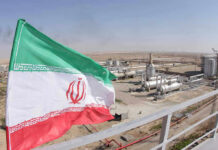Mexico’s president issues a stern warning to the U.S. against violating its sovereignty following the designation of Mexican cartels as terrorist organizations.
Quick Takes
- U.S. unilaterally designates six Mexican cartels as foreign terrorist organizations
- Mexican President Claudia Sheinbaum emphasizes cooperation over coercion in fighting drug cartels
- Sheinbaum proposes constitutional amendment to reject foreign interventions in Mexico
- U.S. Defense Secretary Pete Hegseth states all options are on the table for dealing with cartels
- Mexico commits to working with U.S. to stop fentanyl flow but opposes American interference
Mexico Pushes Back Against U.S. Cartel Designation
In a bold move that has heightened tensions between the United States and Mexico, the U.S. has unilaterally designated six Mexican organized crime groups as foreign terrorist organizations. This decision, made without consulting Mexico, has prompted a sharp response from Mexican President Claudia Sheinbaum, who warns against any violation of Mexican sovereignty under the guise of combating drug cartels.
President Sheinbaum’s stance reflects a growing concern in Mexico about potential U.S. intervention in their domestic affairs. The Mexican leader has emphasized the need for cooperation rather than coercion in addressing the complex issue of drug-related crime that affects both nations.
The Mexican government fears that the U.S. designation of Mexican organized crime groups as “terrorists” could be used as justification for U.S. military intervention or unilateral action on Mexican soil, which would be a massive violation of sovereignty. It would also have… https://t.co/bC5Hd86nKP
— Drop Site (@DropSiteNews) February 15, 2025
U.S. Considers All Options in Cartel Fight
The situation has been further complicated by statements from U.S. officials. Defense Secretary Pete Hegseth has declared that “all options are on the table” for dealing with Mexican cartels, a statement that has not been well received in Mexico City. This follows earlier suggestions by former President Trump about potentially bombing Mexican drug cartels to stop the flow of narcotics into the United States.
Adding fuel to the fire, Trump’s former and current border czar, Tom Homan, has threatened military action if cartels target U.S. security forces. These aggressive stances from American officials have led to increased diplomatic tension between the two countries, with Mexico viewing such statements as potential threats to its national sovereignty.
Mexico’s Commitment to Cooperation and Sovereignty
Despite the heightened rhetoric, Mexico remains committed to working with the United States to address the fentanyl crisis and other drug-related issues. However, President Sheinbaum has made it clear that this cooperation must not come at the expense of Mexican autonomy. In a significant move, she has proposed a constitutional amendment that would explicitly reject foreign interventions in Mexico, further solidifying the country’s stance on protecting its sovereignty.
This development underscores the delicate balance that both nations must maintain in their efforts to combat drug cartels and transnational crime. While the United States seeks more aggressive measures to address the drug crisis affecting its communities, Mexico is pushing for solutions that respect its territorial integrity and legal framework.
The Path Forward: Diplomacy and Mutual Respect
As tensions simmer, the international community watches closely to see how these two neighboring countries will navigate this complex diplomatic situation. The designation of Mexican cartels as terrorist organizations by the U.S. has clearly struck a nerve in Mexico, highlighting the need for more nuanced and collaborative approaches to shared security challenges.
For now, it appears that both sides are holding firm to their positions. The U.S. continues to explore various options for combating the influence of drug cartels, while Mexico staunchly defends its right to handle internal matters without foreign interference. As this situation unfolds, it will be crucial for both nations to find common ground that allows for effective cooperation without compromising Mexico’s sovereignty or the United States’ security concerns.
The coming weeks and months will likely see intense diplomatic efforts to reconcile these divergent approaches and maintain the strong bilateral relationship that has long existed between the United States and Mexico. The outcome of these discussions could have far-reaching implications for regional security, drug enforcement policies, and the broader landscape of U.S.-Mexico relations.
Sources:
- https://www.reuters.com/world/americas/mexico-was-not-consulted-us-designation-cartels-terrorist-organizations-2025-02-20/
- https://www.npr.org/2025/02/20/nx-s1-5304248/mexico-warns-the-us-not-to-invade-our-sovereignty-in-fight-against-cartels
- https://www.newsmax.com/newsfront/mexico-claudia-sheinbaum-trump-administration/2025/02/20/id/1199912











